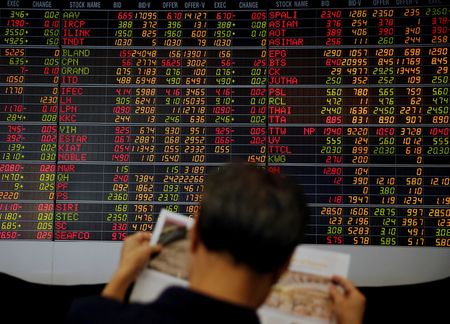By Naomi Rovnick and Stella Qiu
LONDON, SYDNEY (Reuters) -Global shares fell from 14-month highs hit last week, as investors awaited testimony from U.S. Federal Reserve Chair Jerome Powell in markets that remain dominated by monetary policy bets.
The MSCI’s broad gauge of world stocks softened by 0.3%, with Wall Street markets closed for the Juneteenth holiday.
In Europe, the Stoxx 600 share index lost 0.7%. Short-term UK government bonds continued selling off ahead of the Bank of England’s monetary policy decision on Thursday, at which it is widely expected to lift interest rates for the 13th consecutive meeting.
After a week in which the stock market cheered the Fed’s decision to skip a rate increase in June, Powell is scheduled to deliver congressional testimony on Wednesday and Thursday.
Hopes that the Fed will end its most aggressive rate increase campaign in decades are boosting global stock indices dominated by the U.S. tech megacaps that tend to outperform when risk appetite is buoyed by easier monetary policy.
Billions of dollars have flowed into big tech in recent weeks, with analysts citing the productivity-improving potential of artificial intelligence for the rally.
“The obvious narrative of AI has dominated this rally in tech stocks,” said Dan Cartridge, portfolio manager at Hawksmoor.
“But a lot of it is also to do with interest rate expectations,” he added, warning that the Fed staying hawkish would mean “we quite quickly see valuation compression again”.
In Europe, sterling traded near its highest against the dollar since April 2022, at $1.279.
Bets that the Bank of England would raise interest rates to a 15-year high this week, as inflation continues to run at more than four times its target, have bolstered the pound. Money markets now put a 75% chance of the BoE opting for a 25 basis point (bp) rate rise and a 25% likelihood of a 50 bp hike.
Two-year British government bond yields, which reflect rate expectations and rise when the price of the debt instruments falls, added 7 bps to 5.01% – surpassing last week’s 15-year high. The 10-year British gilt yield stood at 4.462%, in an inverted yield curve pattern that can precede recessions.
In Asia, Japan’s Nikkei tumbled 1%, edging down from three-decade highs.
Chinese blue chips fell 0.9%, while Hong Kong’s Hang Seng Index slumped 1.2%, as investors’ hopes of forceful economic stimulus from Beijing were dashed by the lack of concrete details from a cabinet meeting on Friday.
Goldman Sachs on Sunday cut its forecast for China’s GDP growth this year to 5.4% from 6.0%, joining other major banks to slash growth expectations for the world’s second-largest economy.
But the People’s Bank of China is also widely expected to cut its benchmark loan prime interest rates on Tuesday, following a similar reduction in medium-term policy loans last week.
Elsewhere, the dollar index was little changed against major peers at 102.33 on Monday, after falling 1.2% the previous week, the most in five months.
The yen was undermined by Friday’s dovish Bank of Japan meeting, touching a seven-month low of 141.97 per dollar, while the hawkish European Central Bank, which raised rates by a quarter point last week, helped the euro hold near a five-week top at $1.092.
In oil markets, Brent crude was steady at $76.65 a barrel. [O/R]
Gold prices were flat at $1,954.39 per ounce.
(Reporting by Naomi Rovnick and Stella Qiu; Editing by Tom Hogue, Gerry Doyle, Emma Rumney and Sharon Singleton)

